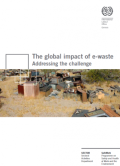This joint Poverty-Environment Partnership paper aims to stimulate a dialogue among developing country policymakers, development partners and other stakeholders on how best to support country-led efforts to build inclusive green economies. Through a shared commitment to putting into place the building blocks of a green economy for all, real and lasting progress can be made towards overcoming poverty and inequality and achieving sustainable human development.
This report outlines challenges and innovations arising around the world as communities and governments pursue an agenda of justice based on inclusive and sustainable use of natural resources and the environment. The paper highlights trends in strategies emerging across regions (Asia-Pacific, Arab States, Africa, and Latin America and Caribbean), including the integration of environmental principles in constitutions, as well as in national laws and regulations, and ensuring access to remedies through courts in environmental matters, such specialized tribunals. It also highlights how social mobilization and demands for social accountability for environmental justice utilize key legal empowerment strategies, such as paralegal support to raise legal awareness, monitor policies and programmes, promote engagement in legal and policy reform, as well as support public interest litigation.
This report provides a detailed diagnosis of the youth labour market in Tunisia, including a focus on vocational education and training and entrepreneurship, and within the context of Tunisia's transition to a green economy. The report takes an international comparative perspective, offering policy options to help improve school-to-work transitions. It also provides an opportunity for other countries to learn from the innovative measures that Tunisia has taken to strengthen the skills of youth and their employment outcomes.
This report provides an assessment of existent and potential green jobs in major economic industries of a small island developing state: Mauritius. It aims to inform and shape the Maurice Île Durable (MID) project, which was launched in 2008 with the objective to make Mauritius a world model of sustainable development.
This policy brief draws the attention of policy-makers and social partners in least developed countries to the role of skills development in facilitating the building of greener economies, as a way to achieve sustainable development and poverty eradication. It has been written at the request of ILO constituents from LDCs, where environmental deterioration and the consequences of climate change are among the major challenges of the twenty-first century. While change is a challenge, it also offers economic and employment opportunities. The brief arises out of the Green Jobs Initiative, a partnership between the ILO, the United Nations Environment Programme (UNEP), the International Trade Union Confederation (ITUC) and the International Organization of Employers (IOE). It draws on research applied in policy design and numerous case studies of country experiences and good practices.

Going Green at the Grassroots narrates how the Inter-American Development Bank (IDB), in partnership with Nordic Development Fund (NDF), is working with companies across Latin America and the Caribbean to harness the enormous potential of energy efficiency and small-scale renewable energy. The IDB has conducted more than 30 energy efficiency audits and feasibility studies across a range of sectors, from shrimp farming to clothing manufacturing to dairy operations. Energy engineering specialists perform energy audits, self-supply renewable energy assessments, financial feasibility studies and develop project design plans in Central America. This case study illustrates how a private sector initiative is gaining steam in Central America and demonstrating, company by company, the feasibility and appeal of renewable energy.
This manual provides guidance on how to use indicators in designing and implementing green economy policies at the national level. It seeks to support interested countries to use indicators as a tool for identifying priority issues, formulating and assessing green economy policy options, and evaluating the performance of policy implementation. Emphasis is placed on those policy options with “multiple dividends” across the environmental, social and economic dimensions of sustainable development.
This study offers a critical review of the strengths and weaknesses of various methodologies, and of the adequacy of models to help countries to assess their economies and develop green economy strategies. This report, however, does not identify the best approaches for formulating and evaluating green economy strategies; instead, it provides key information for the ministries tasked with planning and implementing responsibilities to evaluate the adequacy of various models in meeting their specific needs.
The key message emerging from the study is that Green Economy can be an effective tool in transitioning Egypt into a sustainable development path that can address the main challenges facing the country. This publication is supplemented with a document showcasing successful existing green initiatives in Egypt. The Green Economy: Egypt Success Stories highlights local ventures, cleaner production centres, financial assistance programmes and entrepreneurial projects that are successful in generating economic, social and environmental benefits. It aims to inform policy makers and businessmen about the financial and economic viability of green investments and business.
